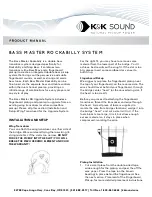
ABEM Terrameter SAS 1000 / SAS 4000
- 26 -
5
ELECTRODES AND CABLES
5.1
ELECTRODES
Two types of electrodes are available from ABEM:
•
Stainless steel electrodes
•
Non-polarisable electrodes
The purpose of an electrode is to establish electric contact between an electronic conductor
(the cable) to an ionic conductor (the earth). All sort of electrodes generate ”noise”. This is of
importance only at the potential electrodes. Noise is defined as the fluctuating voltage that
appears between a pair of electrodes, placed so close that no other ”natural” voltages appear.
One way - among several other ways - to measure the electrode noise is to place two
electrodes in a case filled with soil, and register the fluctuating voltage as a function of time.
It appears that non-polarisable electrodes create much less noise than steel electrodes. Another
observation is that stainless steel electrodes create less noise than electrodes made of ordinary
steel. An example of noise recording made between two pairs of electrode, one non-
polarisable (Pb-PbCl
2
) pair and one of stainless steel pair, is shown in Figure 7. Note the large
zero shift and change in time in the data recorded with the steel electrodes.
5.1.1
Steel Electrodes
Resistivity surveys can be conducted using current electrodes made of ordinary steel.
Potential electrodes made of ordinary steel can also be used under favourable circumstances
but here stainless steel is preferred.
ABEM electrodes are made of stainless steel.
5.1.2
Non-polarisable Electrodes
Self potential surveys require non-polarisable electrodes. Also Induced
Polarization soundings are preferably measured with non-polarisable
electrodes. The ABEM Terrameter type of electrode consists of a solid
state gypsum rod, covered with a plastic cylinder. The gypsum contains
lead-chloride (PbCl
2
), and a solid lead rod is placed in the centre. This
electrode does not need any special care. However, after using an
electrode, always clean it and replace the electrode cover to prevent drying
out.
WARNING: The content of the electrode is poisonous.
•
Do not put the electrodes into your mouth
•
Avoid direct contact with the electrodes - use protective gloves
•
Wash your hands after any direct contact with the electrodes
•
Keep the electrodes away from children
•
Store safely, away from children
•
Dispose off properly
















































